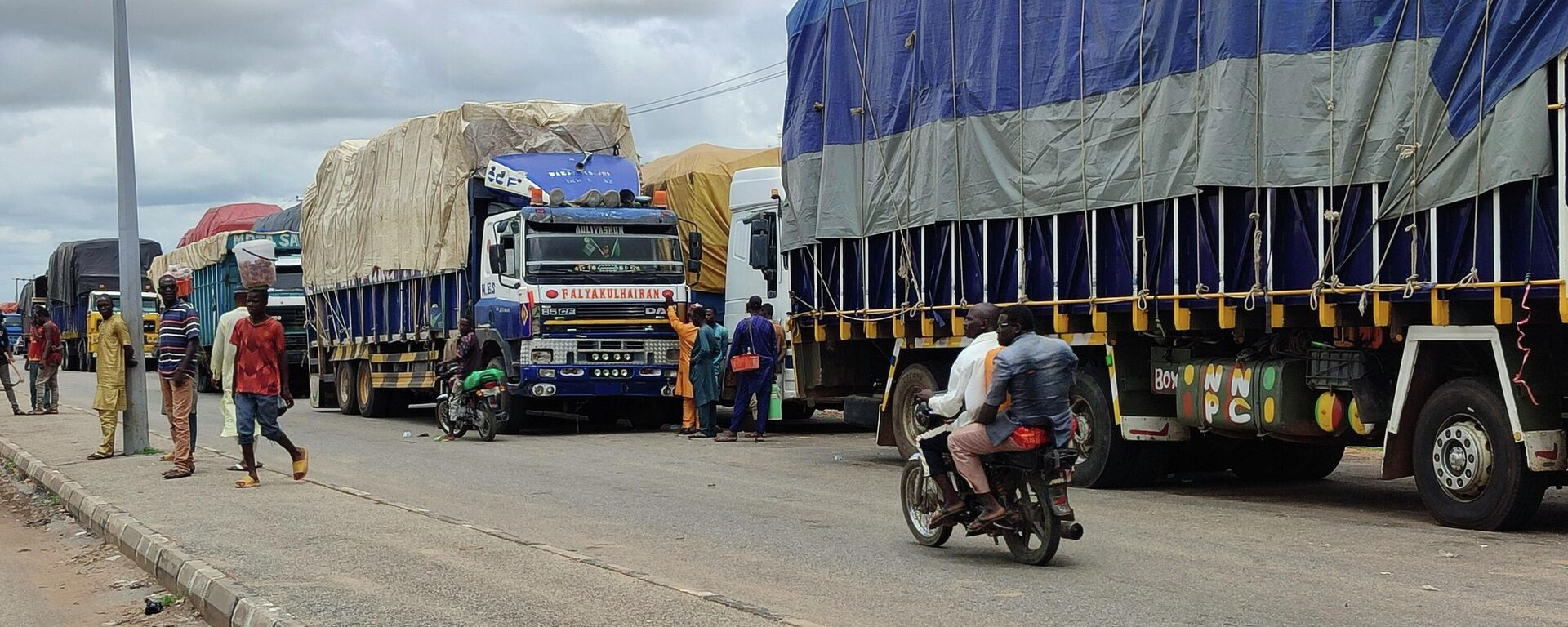https://en.sputniknews.africa/20230831/un-humanitarian-groups-urge-exemptions-to-niger-sanctions-to-safeguard-populations-health-1061758433.html
UN, Humanitarian Groups Urge Exemptions to Niger Sanctions to Safeguard Population's Health
UN, Humanitarian Groups Urge Exemptions to Niger Sanctions to Safeguard Population's Health
Sputnik Africa
On July 26, a coup took place in Niger, in which President Bazoum was ousted and detained by his own guard, led by General Abdourahamane Tchiani. In response... 31.08.2023, Sputnik Africa
2023-08-31T11:32+0200
2023-08-31T11:32+0200
2023-08-31T11:41+0200
situation in niger after military coup
west africa
niger
coup
military coup
sanctions
united nations (un)
humanitarian aid
economic community of west african states (ecowas)
https://cdn1.img.sputniknews.africa/img/07e7/08/1f/1061760277_0:0:3072:1728_1920x0_80_0_0_85402891a53b945b303b19264a29c054.jpg
The United Nations (UN) and a number of humanitarian groups are appealing to the Economic Community of West African States (ECOWAS) to allow exemptions to the sanctions imposed on Niger following the July 26 military coup. According to the humanitarian organizations, these sanctions are beginning to pose a threat to the health and well-being of the population. Emmanuel Gignac, the representative of the UN refugee agency in Niger, said that the current situation prevents the delivery of humanitarian aid into the country.Additionally, with Nigeria cutting off electricity supplies to Niger, the situation could worsen as people increasingly rely on generators, which would be affected if fuel supplies are disrupted, the UN official noted.Martin Griffiths, the head of the UN Office for the Coordination of Humanitarian Affairs (OCHA), has written to ECOWAS requesting exemptions from the sanctions, as reported by media.Several organizations, including the International Rescue Committee (IRC), have joined in the appeal, emphasizing the critical need for exemptions to ensure uninterrupted access to humanitarian assistance, particularly for vulnerable populations such as children. Paolo Cernuschi, the director of the IRC in Niger, highlighted the urgency of the situation.In early August, EU Special Representative for the African Sahel Emanuela Del Re said that the European Union was satisfied that ECOWAS sanctions against Niger are starting to take effect by causing a shortage of food and medication in the coup-hit country.Niger's military announced the removal of President Mohamed Bazoum and the establishment of the National Council for the Defense of the Fatherland (CNSP) through a televised address in late July.Leaders of most Western countries and the Economic Community of West African States (ECOWAS) condemned the coup. In early August, participants in an emergency meeting of ECOWAS chiefs of staff in Abuja, Nigeria, approved a contingency plan for military intervention in Niger to restore Bazoum to power.
https://en.sputniknews.africa/20230809/eu-pleased-sanctions-cause-food-medicine-shortages-in-niger-special-envoy-says-1061204577.html
west africa
niger
Sputnik Africa
feedback@sputniknews.com
+74956456601
MIA „Rossiya Segodnya“
2023
Muhammad Nooh Osman
https://cdn1.img.sputniknews.africa/img/07e7/04/0a/1058467512_0:0:1280:1280_100x100_80_0_0_ec723833bcbfcaed2e21952965ad99e4.jpg
Muhammad Nooh Osman
https://cdn1.img.sputniknews.africa/img/07e7/04/0a/1058467512_0:0:1280:1280_100x100_80_0_0_ec723833bcbfcaed2e21952965ad99e4.jpg
News
en_EN
Sputnik Africa
feedback@sputniknews.com
+74956456601
MIA „Rossiya Segodnya“
Sputnik Africa
feedback@sputniknews.com
+74956456601
MIA „Rossiya Segodnya“
Muhammad Nooh Osman
https://cdn1.img.sputniknews.africa/img/07e7/04/0a/1058467512_0:0:1280:1280_100x100_80_0_0_ec723833bcbfcaed2e21952965ad99e4.jpg
west africa, niger, coup, military coup, sanctions, united nations (un), humanitarian aid , economic community of west african states (ecowas)
west africa, niger, coup, military coup, sanctions, united nations (un), humanitarian aid , economic community of west african states (ecowas)
UN, Humanitarian Groups Urge Exemptions to Niger Sanctions to Safeguard Population's Health
11:32 31.08.2023 (Updated: 11:41 31.08.2023) Muhammad Nooh Osman
Writer/Editor
On July 26, a coup took place in Niger, in which President Bazoum was ousted and detained by his own guard, led by General Abdourahamane Tchiani. In response to the developments in Niger, the regional economic bloc ECOWAS imposed a package of sanctions and closed its borders with the landlocked nation.
The United Nations (UN) and a number of humanitarian groups are appealing to the Economic Community of West African States (
ECOWAS) to allow exemptions to the sanctions imposed on Niger following the July 26 military coup.
According to the humanitarian organizations, these sanctions are beginning to
pose a threat to the health and well-being of the population.
Emmanuel Gignac, the representative of the UN refugee agency in Niger, said that the current situation prevents the delivery of humanitarian aid into the country.
"There is no way to bring humanitarian aid into the country," Gignac was quoted as saying by Western media. "The immediate goods (affected) is going to be food and then it's going to be access to medicine, to drugs."
Additionally, with Nigeria cutting off electricity supplies to Niger, the situation could worsen as people increasingly rely on generators, which would be affected if fuel supplies are disrupted, the UN official noted.
Martin Griffiths, the head of the UN Office for the Coordination of Humanitarian Affairs (OCHA), has written to ECOWAS requesting exemptions from the sanctions, as reported by media.
Several organizations, including the International Rescue Committee (IRC), have joined in the appeal, emphasizing the critical need for
exemptions to ensure uninterrupted access to humanitarian assistance, particularly for vulnerable populations such as children. Paolo Cernuschi, the director of the IRC in Niger, highlighted the urgency of the situation.
"The clock is ticking, and the lives of Nigerien children are hanging in the balance," Cernuschi said. "Currently, stocks of vital supplies, such as nutritional aid and medical provisions, are held up at the borders due to sanctions. In a nation where acute malnutrition rates are alarmingly high, these delays could prove catastrophic."
In early August, EU Special Representative for the African Sahel Emanuela Del Re said that the European Union was satisfied that ECOWAS sanctions against Niger are starting to take effect by causing a shortage of food and medication in the coup-hit country.
"Sanctions are starting to take effect. There is not enough medication, not enough food. Power outages are even more frequent than before. If we want [the Nigerien military] junta to weaken, we must continue with the sanctions,"
Del Re told Italian daily La Repubblica on August 9.
Niger's military announced the
removal of President Mohamed Bazoum and the establishment of the National Council for the Defense of the Fatherland (CNSP) through a televised address in late July.
Leaders of most
Western countries and the Economic Community of West African States (ECOWAS) condemned the coup. In early August, participants in an emergency meeting of ECOWAS chiefs of staff in Abuja, Nigeria, approved a contingency plan for military
intervention in Niger to restore Bazoum to power.



